- The subject matter is one of the most passionately debated aspects in the context of securing the lives of millions of commuters traversing roads across the length and breadth of the country. At the best of times, Indian commuters are forced to compromise on the quality of roads provisioned to them with a prayer on their lips. Such are the conditions of the roads that it takes tremendous riding/driving skills to not only navigate on those treacherous stretches dotted with potholes but also elicit tremendous patience and gumption to sail through unharmed. Ask any commuters irrespective of their standing in the societal hierarchy, the story emanating from each one of them would be more or less similar i.e. one turbulent story after another about the commuting travails.

PC: Pexels
- Further, the awareness of road safety standards is also poor in the country that needs to be reiterated for the general good. The two-wheeler riders, including the pillion riders, are loath to wear a helmet as protective gear despite fully knowing that they may be saved from a fatality in the event of incidents/accidents. The less said the better about four-wheeler drivers consistently failing to diligently follow the safety standards. You will witness millions of drivers without a safety belt zipping on the national highways, leave alone interior roads. The sheer lack of safety awareness and the deterring enforcement amongst the Indian citizens needs no further elaboration.
- This is despite the efforts undertaken by the government machinery in spreading the inevitability of safety standards perpetually. It pains to read the tragic, untimely, and avoidable accidental death of Cyrus Mistry. And so were hundreds of other similar tragedies – had the practice of rear passengers in cars wearing seat belts been universal in India. Almost every Indian is guilty of disregarding this safety norm with impunity. While many front seat passengers now fasten seat belts, thanks in part to legal requirements and lately due to built-in warning beeps in cars, those in rear seats assume they are less vulnerable to accident injuries. Indian law requires seat belts for all car passengers and dual airbags for front seat travellers.
- Note that Mistry’s car had rear airbags too, as is the norm in luxury cars now. However, since he wasn’t wearing a seat belt, as per initial police investigations, he may have crashed against the front seat before the airbag was deployed. Mind you, rear seat belts slow down this dangerous forward momentum. Even in cars without rear airbags, a rear seat belt can act as a check against a sudden, violent force. Also, safety research shows that wearing rear seat belts also reduces the risk for front passengers, who otherwise can be injured by rear passengers being thrown forward, sometimes more than once, depending on the force of the collision and the speed of the vehicles.

PC: Morellilaw
Look at the statistics. The road and highways ministry’s road accidents report for 2020 reveals that 15,100 drivers and passengers were killed due to the non-use of seat belts. For a better perspective, 17,800 travellers in four-wheelers were killed that year. A scary indicator indeed of how many people are dying because of non-compliance with a basic safety feature. What should be the way out then? Given the laxity in enforcing traffic rules, especially on highways, all cars must come with built-in warning beeps for non-use of not just front seat belts but also rear seat belts. Maybe the annoying and persistent noise will succeed in finally driving home some sense into all of us. Remember, someone is waiting for us to return home safely.






